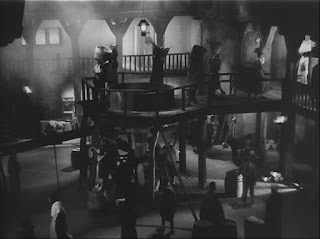Dir. Victor Halperin
It's impossible to talk about White Zombie without mentioning Romero's Night of the Living Dead (1968). White Zombie is technically the first zombie film - ever. The zombies are referred to by name, are people who have been brought back to life from death, and are mindless. They are best illustrated in an early scene, where the local sugarcane mill is discovered by Charles (Robert Frazer) to be run entirely by the zombie-thralls of Voodoo master Murder Legendre (Bela Lugosi) - yes his first name is actually murder.
Here, the zombies are not brought back to life from death by radiation (as hypothesized by scientists in Night of the Living Dead), or via a biological virus (a-la most zombie films). In White Zombie they are thralls of a skilled practitioner of voodoo, a mystical belief system that, at least in the film if not in reality, can control the minds of both the living and the dead - being so powerful a will in Murder's case, that the dead themselves are compelled to return to 'life' to obey him. This 'life' is representative of what we know about the classic Night of the Living Dead zombies, at least in part - they have no free will, cannot speak beyond grunts and moans, walk slowly, and can commit murder.
Differences abound however - they retain abilities from before their death, most notable in Madeline (Madge Bellamy) who can play the piano beautifully as a zombie, but with no passion or spirit, and more widely in the 'workers' of the mill, who carry baskets, and operate machinery such as the mill wheel. More modern zombies have 'evolved' in their own way to reflect this characterization, some even using guns, such as in the Resident Evil franchise (both games and films). My favourite example of this is in the first season of The Walking Dead where one zombie has a 'routine' of returning to its home, and looking through the peep-hole of the door. Here, there are none of the common zombie tropes: no bites turning the living into zombies, no cannibalism, and no brain destruction completely killing the zombie (although this is more a case of lack of opportunity in the plot in White Zombie) - all, incidentally, introduced by Romero, a fact which deserves more credit than is given - it's astonishing how much one man's vision of the living dead continues to this day.
But White Zombie has power in its own right - best shown here in the mill scene. In their filmic introduction, the zombies - a word completely new here, already predict the behaviours that we find to be 'zombie'-like in our common parlance - that is, mindless and passionless activity. Edgar Wright parodies it in the brilliant opening of Shaun of the Dead (2004) where we see shop-keepers, kids playing with footballs, dancing youths (etc.) perform activity in such a way that it is robotic and completely inhuman.
The zombies of White Zombie provide a warning in their very inception, that horror is being a slave, that horror is performing actions without passion, that horror is murder done on the behalf of others. These are modern horrors - working a robotic (that word again - perhaps the modern version of this zombie archetype?) job in a factory, watching day-time TV vegged out on the sofa, even the gym where exercise is stationary and regimented. Koyaanisqatsi (1982), a film I've covered on the blog in the past, deals with this existential horror - with scenes of factory and supermarket workers performing the same actions over and over and over.
Zombies would go on to be meaner, and act more as personifications of death itself, a symbol that persists as most prominent to this day, being a prime source for interpretation, best seen in the entire Living Dead franchise. But in White Zombie the mindlessness of the zombie is the largest horror, the worst thing imaginable in the film seems less to be the zombie's ability to kill you, and more the fact that the zombie can play the piano as well as when it was alive - but with no shred of humanity, no soul. Coming back from death is impossible without this core cost of soullessness, and it remains a perversion, a slavery to a voodoo master. In our modern day lives, if we feel zombie-like, then we have to ask - who is our master?
P.S Both White Zombie and Night of the Living Dead are in the public domain and legally free to watch and even sell copies of. I've linked the wikipedia links to the films here which contain the entire films - free to watch. Just in case you're bored this Halloween season!
P.P.S I realize that last sentence is very teenage-angst, anti-authoritarian bullshit, but does have some truth in it. Although the best rebuttal to that point of view is Bob Dylan's You Gotta Serve Somebody.



No comments:
Post a Comment